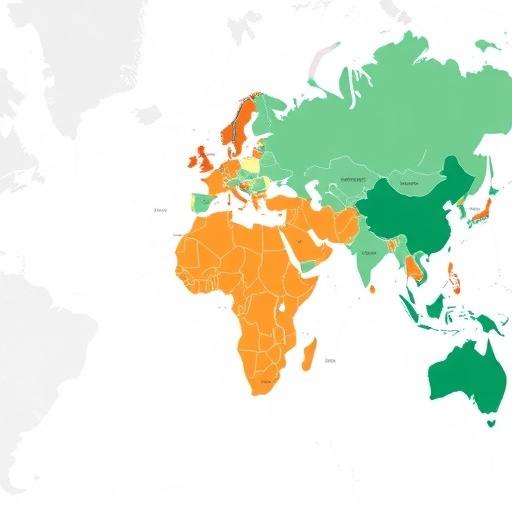A comprehensive examination of regional disparities and international spillover effects in the pursuit of the Sustainable Development Goals (SDGs) unveils a complex tapestry of interconnected challenges and opportunities that define the contemporary global landscape. A recent study conducted by a team of researchers offers invaluable insights into how various regions around the world are progressing towards the ambitious targets set forth by the United Nations. The study goes beyond mere statistics to elucidate the underlying factors that contribute to the uneven advancement of the SDGs, provoking critical discourse around strategies for achieving equitable growth and sustainability.
As the world grapples with the multifaceted implications of climate change, economic inequality, and social injustice, the urgency of achieving the SDGs has never been more pronounced. This research probes into the systemic discrepancies that exist not only within countries but also across international borders. The authors highlight that while some nations are making commendable strides towards sustainable development, others are left behind due to a myriad of socio-economic factors, governance challenges, and resource constraints. This dissection of regional performance underscores the importance of collaborative efforts in addressing these disparities.
One fundamental aspect of the study lies in its exploration of international spillover effects, which refers to how progress or setbacks in one region can significantly impact others. The interconnectedness of national economies means that improvements in sustainable practices in developed countries can inspire similar initiatives in developing nations, while deteriorating conditions can lead to adverse consequences elsewhere. This phenomenon is critical in understanding the global implications of local actions, reinforcing the notion that sustainability is not a solitary endeavor but a collective responsibility.
Significantly, the authors of the study bring attention to the role of policy frameworks and governance structures in shaping the trajectory of sustainable development initiatives. They argue that effective leadership and sound policies are indispensable in harnessing local resources and mobilizing communities to prioritize SDGs. The research identifies clear correlations between robust governance and higher success rates in achieving sustainable targets, illustrating the necessity of political will and institutional integrity in fostering environments conducive to sustainable practices.
Moreover, the study delves into the social dimensions of sustainability, emphasizing the critical role of community engagement and grassroots movements. The authors assert that localized efforts often serve as catalysts for change, redefining approaches to sustainable development that resonate more deeply with the communities they aim to benefit. Enhancing public awareness and involvement leads to more effective implementation of sustainability initiatives and ensures that interventions are tailored to the unique needs and circumstances of diverse populations.
In addition, the researchers highlight the significance of transnational collaborations in augmenting efforts towards SDGs. Global partnerships, as showcased in various case studies, illustrate the power of shared knowledge and resources in addressing crucial sustainability challenges. These collaborative ventures enable countries to learn from one another’s successes and failures, accelerating the overall progress towards universally accepted goals. The synergistic effects of such partnerships can be monumental in bridging the gaps that persist between different regions.
The study’s analytical framework provides a nuanced understanding of how regional characteristics—including economic status, demographic trends, and existing infrastructural capacities—play a pivotal role in shaping outcomes. By employing a robust methodology, the researchers were able to quantify these variables and illustrate their interrelations, informing policymakers about leverage points that may yield the most significant impact in their respective areas. This empirical grounding is essential for the development of targeted strategies that can mitigate disparities and enhance progress towards the SDGs.
As the narrative unfolds, it becomes evident that the path towards sustainable development is fraught with complexities that cannot be overlooked. The challenges faced by regions lagging in progress symbolize not just statistical gaps but represent real human struggles, necessitating an urgent reevaluation of global priorities. Addressing these issues with sensitivity and urgency forms the crux of the sustainable development discourse, where every action taken today can sow the seeds for a more equitable and sustainable tomorrow.
In conclusion, the findings presented in this study serve as a clarion call for heightened awareness and concerted action on the part of all stakeholders involved in sustainable development. The disparities illuminated by the research echo the need for innovative solutions that are inclusive and considerate of varying regional contexts. The overarching message advocates for a shared vision that transcends borders, encouraging nations to embrace collaborative frameworks that facilitate the flow of ideas, resources, and best practices aimed at achieving the SDGs.
In a world increasingly defined by its differences, the study highlights that the journey toward sustainability is simultaneously a local and global endeavor. It is a narrative of humanity coming together, recognizing the scars of inequality, and striving tirelessly to overcome them. Each step taken towards achieving the SDGs, no matter how small, contributes to a larger, more interconnected journey towards global sustainability that benefits all.
In essence, this compelling exploration of regional disparities and international spillover effects amplifies the call for action. It inspires not only an examination of where we stand but challenges us to envision where we want to be—a world united by the principles of justice, equity, and sustainability.
Subject of Research: Regional disparities and international spillover in achieving the Sustainable Development Goals (SDGs)
Article Title: Regional disparities and international spillover in achieving the sustainable development goals (SDGs) across the globe.
Article References:
Kanojia, S., Kapoor, N., Chhabra, M. et al. Regional disparities and international spillover in achieving the sustainable development goals (SDGs) across the globe.
Discov Sustain 6, 993 (2025). https://doi.org/10.1007/s43621-025-01898-z
Image Credits: AI Generated
DOI:
Keywords: Regional disparities, Sustainable Development Goals, international spillover, sustainability, governance, policy, community engagement, collaboration, economic inequality.




